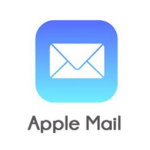3. Gmail
 While Gmail might be better than the previous two entries on this list, it's worth noting that it has privacy issues as well. Google has been known to collect user data across all its platforms. And, while the company has said that it stopped scanning the content of emails for advertising purposes in 2017, the company still scans subject lines. What's worse is that it allows third parties to access your inbox, allowing them to take a peek at your emails.
While Gmail might be better than the previous two entries on this list, it's worth noting that it has privacy issues as well. Google has been known to collect user data across all its platforms. And, while the company has said that it stopped scanning the content of emails for advertising purposes in 2017, the company still scans subject lines. What's worse is that it allows third parties to access your inbox, allowing them to take a peek at your emails.
As far as cybersecurity is concerned, Gmail has worked hard to prevent data breaches and attacks. It has been pushing two-factor authentication on its users and has implemented strong measures to protect against security incidents. Of course, that doesn't mean attacks don't happen. In fact, the company experienced a data breach in 2014, where nearly five million passwords were leaked online.
4. Apple Mail
 Apple Mail can be considered as the most private service on this list. It doesn't track data for advertising. While they still collect your data, the company claims it is primarily used to improve Apple's software. Unfortunately, many apps from the Apple Store don't share the sentiment, as there have been cases of apps conducting invasive data tracking.
Apple Mail can be considered as the most private service on this list. It doesn't track data for advertising. While they still collect your data, the company claims it is primarily used to improve Apple's software. Unfortunately, many apps from the Apple Store don't share the sentiment, as there have been cases of apps conducting invasive data tracking.
Privacy aside, the service has had its fair share of run-ins with data breaches. Security vulnerabilities for Apple Mail have been found on several occasions. While that can happen to any of the email providers on this list, the company has been criticized for how it has handled those incidents.
According to reports, Apple undermined the severity of its vulnerabilities and failed to act on them swiftly. It's the main reason the service made it on this list.
Underestimating or normalizing data breaches is not a posture a secure email provider should take.
Things to Consider When Choosing a Secure Email Provider

There are many things to consider when choosing a secure email provider. One is that you want to ensure the provider uses end-to-end encryption. That means only the email sender and receiver have the keys to decrypt the email message. That will help prevent cyber actors from intercepting messages from your device to the recipient while they're in transit.
Another thing that you should look for is whether the provider respects your privacy. You probably already know this if you've read the privacy policy of most email providers, but they take and use your data. Some, like Yahoo Mail, have even been caught scanning your emails for keywords so they can deliver hyper-personalized advertising straight to your inbox.
If privacy concerns you, consider switching to a different provider because that won't change anytime soon. While most of the top providers like AppleMail and Outlook have been trying to step up their privacy game recently, unfortunately, they're not quite there yet. Providers like ProtonMail and Tutanota, on the other hand, are better in that regard. Both providers prioritize privacy, and the former even has end-to-end encryption.
Lastly, look for a service that has a good track record. Research goes a long way when it comes to finding secure email providers. Check for any recent data breaches or controversies a provider may have experienced, and look at how they dealt with them. That will be very telling of how they will handle your data and your privacy.
Ready to Choose a Secure Business Email?
Email is crucial to any business' operations, but it's also one of the most common attack vectors. That's why it's essential to find an email service that is serious about cybersecurity and privacy. It's one of the best ways to prevent costly data breaches and security incidents.
ITS has been helping hundreds of businesses improve their cybersecurity efforts holistically, including their email. Learn more about how we can help you by scheduling a free network security assessment. Or, if you want to learn more about email security, check out the following resources:
Topics:

 Yahoo Mail has been involved in several controversies regarding breach of trust over the years. The biggest was when it was revealed that it gave US intelligence agencies backdoor access to hundreds of millions of user accounts. The company even provided the government with a specially designed tool that could be used to scan all incoming emails for keywords and information provided by US intelligence officials.
Yahoo Mail has been involved in several controversies regarding breach of trust over the years. The biggest was when it was revealed that it gave US intelligence agencies backdoor access to hundreds of millions of user accounts. The company even provided the government with a specially designed tool that could be used to scan all incoming emails for keywords and information provided by US intelligence officials. Speaking of email services with questionable privacy rules, AOL Mail is another provider with the same intrusive data policies. That's because Apollo Global Management purchased both Yahoo and AOL Mail. Both providers now use the same privacy policy, allowing them full access to everyone's incoming and outgoing emails.
Speaking of email services with questionable privacy rules, AOL Mail is another provider with the same intrusive data policies. That's because Apollo Global Management purchased both Yahoo and AOL Mail. Both providers now use the same privacy policy, allowing them full access to everyone's incoming and outgoing emails.